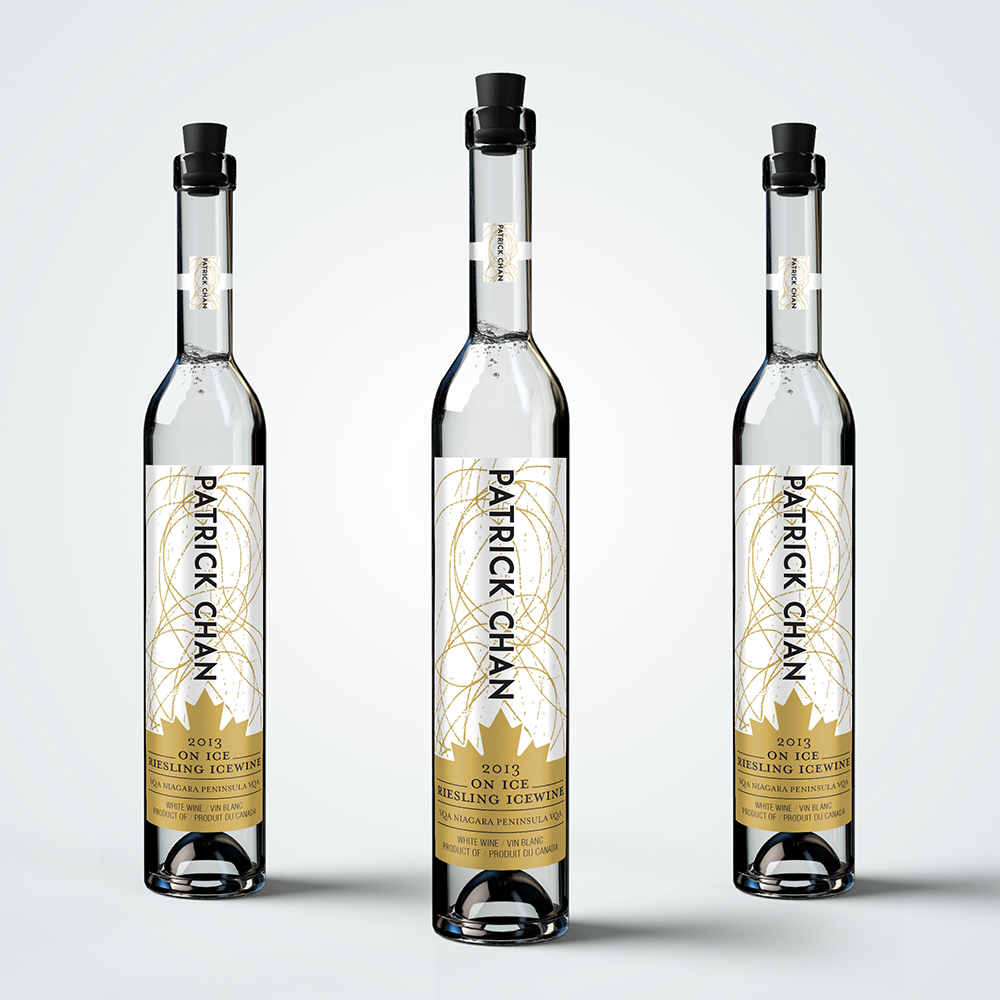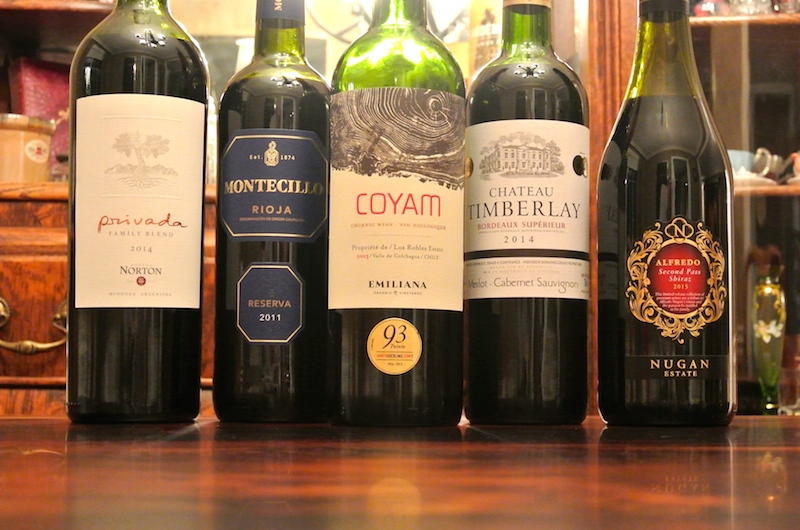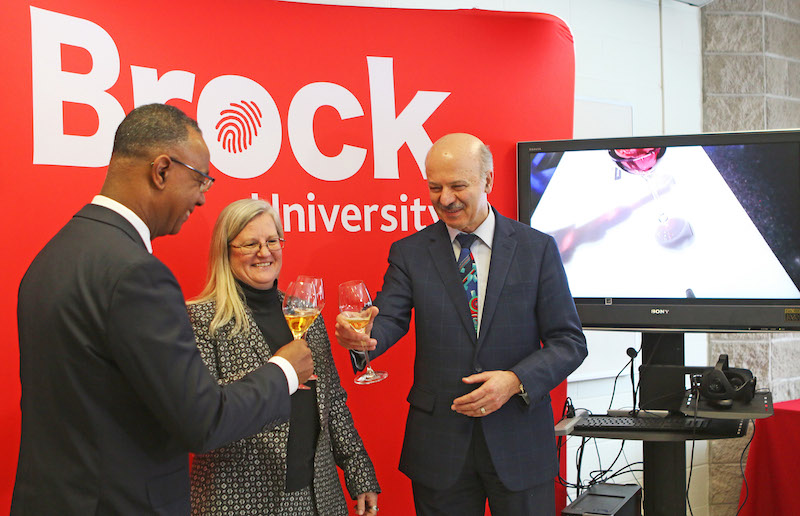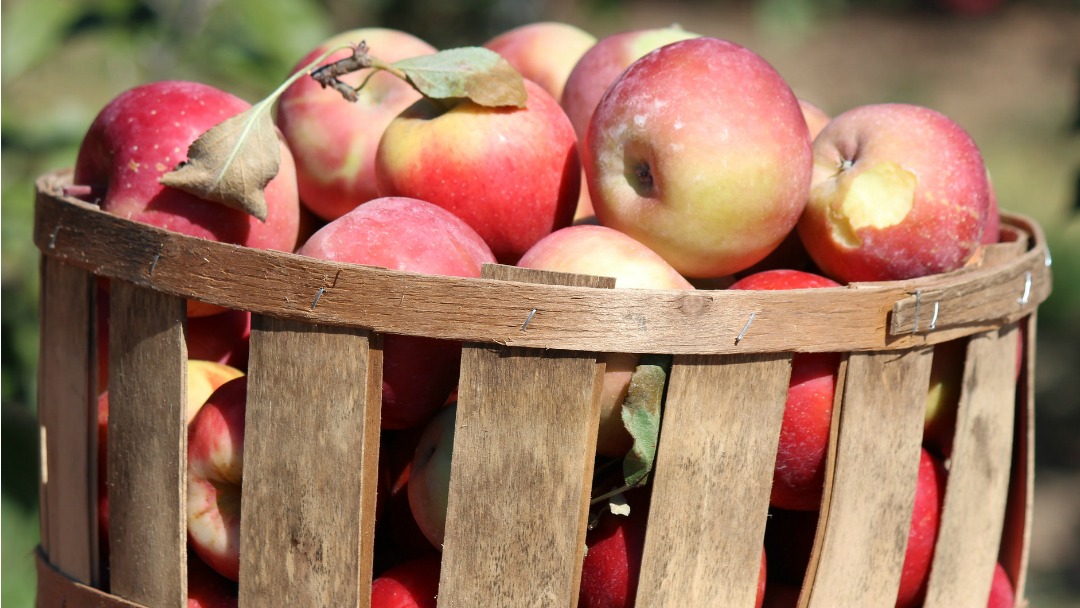
By Rick VanSickle
Getting ready for the Winter Olympics that begin Friday? Should be an exciting 16 days of competition among the world’s best winter Olympians.
We’ve put together a list of six delicious wines from around the world, including Canada, that would pair perfectly while cheering on your favourite athlete from your favourite country.

First, of course, is the Patrick Chan On Ice Riesling Icewine 2013, which is made in Niagara by Flat Rock Cellars. Chan also has a new sparkling wine that’s just been released, but it has not been reviewed by Wines in Niagara.
Chan’s icewine leads our list of six wines that deserve space on your podium during the Games.
Also in this report: Brock’s new sensory lab, weekends of chocolate and wine, Ed Clark not fighting for us anymore, and going to school on Ontario cider.
First, six wines for Olympic viewing:

Patrick Chan On Ice Riesling Icewine 2013 ($31 is a special price on until Feb. 28, 91 points) — An expressive nose of sweet quince, apricot, peach, citrus and honey accents. It’s honeycomb-sweet on the palate but nicely balanced by the acidity with gobs of apricot, peach, lemon and mango fruit. Fine balance, much like the man behind the wine.
Some other wines from around the world to consider:

ARGENTINA:
Norton Privada Family Blend 2014 ($25, restaurants only in Ontario, 92 points) — This Argentine blend of Malbec, Merlot and Cabernet Sauvignon has a generous nose of thick blackberry, wild raspberry, earth, tar and beautiful oak spice notes. The dark berries on the palate meld perfectly with the spice notes, bramble and licorice through a smooth finish.
CHILE:
Emiliana Coyam 2013 ($30, Vintages, 92 points) — This signature wine from Emiliana is a multi-grape blend with mostly Syrah and Carmenere all from organic and biodynamically farmed fruit. What a brilliant nose of blackberries, plums, blueberries, eucalyptus, graphite and spice. It is loaded with an array of fruits on the palate, but also freshness and spice that shows wonderful integration and balance between power and finesse. A delightful wine.
AUSTRALIA:
Nugan Estate Afredo Second Pass Shiraz 2015 ($15, LCBO, 89 points) — This is a “ripasso” style wine that’s re-fermented over the skins of the Nugan Alfredo dried grapes to give it complexity and texture. Look for dark cherry/kirsch, brambly raspberry, cassis, cocoa and spice on the nose. It’s quite rich and expressive on the palate with a range of red/dark fruits, earth spice and a smooth finish.
SPAIN:
Montecillo Rioja Reserva 2011 ($18, LCBO, 88 points) — A highly aromatic and well-aged Rioja that shows mature dark fruits, wood spices, juicy plums and sandalwood. It’s smooth and caressing on the palate and reveals black currants, plums, cassis, licorice and spice with lively acidity to keep it fresh through the finish. Good value here.
FRANCE:
Château Timberlay Bordeaux Supérieur 2014 ($17, LCBO, 88 points) — At the low end of anything from Bordeaux, from a price point of view, this represents a bargain for what you get. It’s a blend of Merlot and Cabernet Sauvignon that shows ripe cassis, blackberry, fresh-cut tobacco, cherry and spice on the nose. It is smooth on the palate with expressive fruit and spice notes.
Ontario grant helps Brock create
first-of-its-kind wine sensory lab

The Ontario Government has announced $960,000 in funding to help Brock University create the world’s first augmented reality, virtual reality and sensory reality consumer laboratory.
The new money from the Ontario Research Fund matches a recent federal grant, and combines with support from the grape and wine industry that will enable Brock’s Cool Climate Oenology and Viticulture Institute (CCOVI) to launch the landmark facility, to be known as the R3CL.
The Ontario grant was announced in January by Reza Moridi, the Minister of Research, Innovation and Science. The $1-million R3CL lab is part of a $2.4-million project that will greatly enhance CCOVI’s research and studies into fermentation, wine flavour and consumer behaviour.
“We are pleased that the Ontario government recognizes the important role Brock University’s research plays in helping Ontario’s grape and wine industry be more strategic and successful in a competitive global marketplace,” said Brock University President Gervan Fearon.
After making the announcement Monday, Moridi was invited to test out the virtual reality technology that will be included in the $1-million R3CL (Physical, Augmented and Virtual Reality Consumer Lab), which will be used to create a variety of environments in which people purchase and consume wines. Researchers will study how a range of factors such as sights, sounds and smells impact choice and impression of wine.

“Supporting Ontario’s researchers as they make breakthrough discoveries will help advance technology and drive economic growth across the province,” said Moridi. “Making sure they are working in state-of-the-art facilities with the most up-to-date technology will help researchers do their best work and lay the groundwork for new products and services, and economic opportunity for people in Ontario.”
The $2.4-million project also includes expanding the capacity of CCOVI’s research winery to include a state-of-the-art fermentation facility, as well as the purchase of several advanced analytical instruments required for grape and wine flavour and aroma analysis.
“We’re thrilled to see that addressing the research priorities of the grape and wine industry is in direct alignment with the provincial priorities of supporting world-class research, commercialization and innovation,” said Brock University Vice-President, Research Tim Kenyon.
CCOVI Director Debbie Inglis said the research at Brock has a direct impact on Ontario’s $4.4-billion wine industry.
“CCOVI’s research tackles priority areas of the grape and wine industry. By working together between the government, academia and industry, we’re able to put forward solutions that help drive our economy forward,” said Inglis, pointing out that a recent economic impact study found CCOVI contributed more than $91 million and the equivalent of 307 jobs to Ontario’s economy.
Did someone say
chocolate and wine?

Over 20 Niagara wineries are pairing wine with chocolate this February from 11 a.m. to 5 p.m. on weekends.
Explore the decadently sweet and savoury art of wine and chocolate pairing as VQA wines are matched with chocolate-infused dishes – from classically sweet flavoured combinations to unexpected surprises.
If you are travelling with a group of 8 or more guests, the organizers suggest that you call ahead to the wineries you plan to visit with your approximate arrival time so that they can plan to serve you better and make your experience an enjoyable one.
The touring pass is valid every weekend in February, so you can come back and enjoy a few wineries every weekend rather than trying to fit them in all in one day.
Click here to print a list of 2018 participating wineries and see a list of the wine and food pairings.
Touring passes are $45 per person (taxes and fees not included) and can be purchased here. Passes are valid for any of the four event weekends.
As cider booms, Brock’s CCOVI
continues to be a key industry partner

With Ontario’s thirst for cider far from quenched, Brock University’s Cool Climate Oenology and Viticulture Institute (CCOVI) continues to be at the forefront of advancing the booming industry.
CCOVI is the only institution in Canada to offer a certification in cider production through the Cider Institute of North America, and it also provides analytical testing services to help cider makers deliver the best product possible.
CCOVI’s Continuing Education Manager Barb Tatarnic says that pairing the foundational educational program with testing services brings a holistic approach to the learning process.
“CCOVI has been able to branch out into an industry that is important here in Niagara and all across Canada,” Tatarnic says. “By delivering the foundational learning elements and then providing the opportunity to test the finished product, we are ensuring cider makers are delivering the quality of product their communities are looking for.”
Maintaining quality from the orchard through to the consumer’s glass is especially crucial when dealing with cider because the product is less established with consumers, adds CCOVI’s Steven Trussler.
“If a consumer tries a faulted product they may simply decide they don’t like cider and that’s a lost customer,” says Trussler, who is the CINA certified instructor in the institute’s cider program. “Having that baseline of knowledge across the country helps producers make a higher-quality product and increases the number of cider consumers, which benefits everyone.”

Cole Ford, lead cider maker at Shiny Apple Cider in Niagara-on-the-Lake, uses a range of services provided by CCOVI as a quality control measure for his products.
“The services provided by CCOVI allow us access to fast, reliable and consistent results, which, for a small-to-medium-sized business like Shiny Apple, is key in providing our consumer the kind of cider they have come to expect from us,” he says.
Ford also says the industry is changing as fast as it is expanding. This forces producers like him to constantly learn new things in order to provide cider products that satisfy changing consumer demands.
“Education is key to improving any industry, and having more courses and more diversity in those courses can only help improve Ontario’s cider industry,” he adds.
With that in mind, CCOVI will be expanding its cider offerings to include more advanced courses in the near future. This would add to the growing number of continuing education courses now offered by the institute, which has more than tripled over the past year. The number of people accessing those courses has also increased significantly, rising from 77 in 2016 to 247 in 2017.
“You can’t stand still when it comes to the direction the industry is evolving,” says Tatarnic. “They always want to learn more, and we want to be at the forefront for those next offerings and learning opportunities.”
After attending a masterclass in advanced cider production last month, taught by renowned cider expert Peter Mitchell at Cornell University, Tatarnic says the seeds were sown for CCOVI to take that next step in further educating the industry.
Mitchell says he’s glad to see such significant growth in the Canadian cider industry and that Brock is in the perfect position to further drive that industry forward.
“As part of the Cider Institute of North America, Brock is uniquely placed and appropriately resourced to take a leading role in Canada in the provision of training, skills and technology development and transfer to new and aspiring cider and perry production enterprises,” he says.
Whose team are you on, Mr. Ed Clark?

This isn’t news, but it is certainly a curiosity.
We found out last week that the once great hope of Ontario getting closer to the privatization of the booze business in Ontario, the former bank whiz Ed Clark, will soon will take over as chairperson of the Liquor Control Board of Ontario (LCBO).
Not only will Clark now take the reins of the largest liquor monopoly in the world, but he will also be responsible for one of the biggest retailers of marijuana in the world, also under the dubious control of the LCBO.
Clark is the retired chief executive of TD Bank and before that headed up Canada Trust.
At 70, Clark isn’t exactly a household name — but his fingerprints are on many files familiar to Ontarians, including the Liberal government’s controversial sale of a majority stake in Hydro One, the provincial electricity distributor.
What is curious is how the man charged by the premier of Ontario, Kathleen Wynne, to explore whether privatization of the liquor business in Ontario was in the government’s best interests will now be working to keep the LCBO under government control.
When Clark made his recommendations to allow grocery stores to sell beer, wine and cider, he opened the door a crack to an eventual dismantling of the monopoly.
By hiring Clark to run the LCBO, any hope of further eroding the antiquated LCBO seems hopeless, at least while the Liberals are running the province.
Here we go again, back to square one.





We were at Emiliana a couple weeks ago in Chile and tried that very wine. I didn’t realize that they were the first biodynamic winery in the valley and are also the largest in all Chile. Beautiful place, lovely people, terrific wines.
Warren … Thanks for the reminder on the organic/bio status … meant to add that in review. Have done so now.